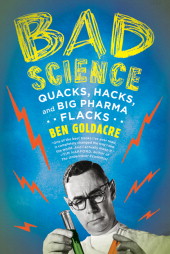Ben Goldacre has written this book to explain how proper scientific research is conducted and why it is conducted the way it is. He spends a great deal of time on the placebo effect and regression to the mean. And, complains that this information isnt taught in schools.
Is the book informative? Yes. Was it worth reading? Most definitely. Especially the part about how pharmaceutical companies can legally and conveniently hide the bad results that they get when testing new drugs.
The writing style is easy enough to follow although there were a few times when I felt he could have been for clear. (Like when he complained that most people dont know the difference between mean, mode and median. It would have been a very simple footnote and its not like he didnt use footnotes. And, mean is the only definition I remember for sure its the average. The other two are the piece of data that is in middle and the one that occurs the most but I dont know which is median and which is mode.) He really has it in for homeopaths andnutritionists and I cant say that I disagree with him on this one. But, he spends a great deal of time on them and Im not familiar with any of the people he names. Perhaps because they are famous only in the United Kingdom.
Overall, a book worth reading.
Is the book informative? Yes. Was it worth reading? Most definitely. Especially the part about how pharmaceutical companies can legally and conveniently hide the bad results that they get when testing new drugs.
The writing style is easy enough to follow although there were a few times when I felt he could have been for clear. (Like when he complained that most people dont know the difference between mean, mode and median. It would have been a very simple footnote and its not like he didnt use footnotes. And, mean is the only definition I remember for sure its the average. The other two are the piece of data that is in middle and the one that occurs the most but I dont know which is median and which is mode.) He really has it in for homeopaths andnutritionists and I cant say that I disagree with him on this one. But, he spends a great deal of time on them and Im not familiar with any of the people he names. Perhaps because they are famous only in the United Kingdom.
Overall, a book worth reading.




![header=[] body=[Get a free book credit right now by joining the club and listing 5 books you have and are willing to share with other members!] Help icon](/images/question.gif?v=90afaeb39)
